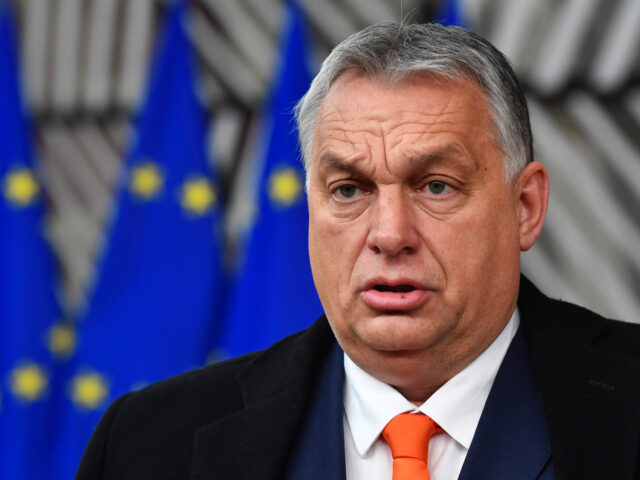The European Union has reportedly drawn up a scheme to “sabotage” Hungary’s economy by attacking the country’s currency and access to capital markets over Prime Minister Viktor Orbán’s opposition to a further 50 billion euros in funding to Ukraine.
According to a report from the globalist Financial Times newspaper, a document produced by the EU Council — the agenda-setting federal body of the bloc — has laid out plans for Brussels to target the Hungarian Forint currency and scare off investors to “sabotage” the country’s economy in an unprecedented way.
The document allegedly states that for the Hungarian economy, “jobs and growth . . . depend to a large extent” on investment from abroad and EU funding, giving Eurocrats the ability to severely damage the country’s economic stability.
The scheme comes amid an ongoing dispute between Budapest and Brussels over the proposed €50 billion ($54bn/£42.5bn) in additional aid to Ukraine. Prime Minister Viktor Orbán has been the chief opponent to pouring more money into the conflict and a lone voice among European leaders consistently calling for peace talks between Kyiv and Moscow.
The populist Hungarian leader has said that he plans to use his national veto power to block the funds, sparking outrage among globalist factions within the bloc that he would deign to use the democratic powers afforded to his country to oppose more funding for the war. There have even been suggestions of stripping away the national veto power within the EU to prevent further roadblocks to the neo-liberal agenda favoured by power players in Berlin, Brussels, and Paris.
The document is claimed to have said that “in the case of no agreement in the February 1 [summit], other heads of state and government would publicly declare that in the light of the unconstructive behaviour of the Hungarian PM . . . they cannot imagine that” EU funding would be given to Hungary.
Should this occur, the document goes on to predict that “financial markets and European and international companies might be less interested to invest in Hungary” and that Brussles’ actions “could quickly trigger a further increase of the cost of funding of the public deficit and a drop in the currency.”
‘Call Back Trump!’ Hungary’s Orbán Tells Tucker Only Trump Can End the Ukraine War and ‘Save the Western World’ https://t.co/1OQf4px2sK
— Breitbart London (@BreitbartLondon) August 30, 2023
While the EU Council refused to comment on the leaked plans to attack the Hungarian economy, unnamed EU diplomats appeared to confirm the plot, telling the FT: “The mood has got harsher,” and “What kind of union do we have if we allow this kind of behaviour?”.
Although the EU has previously used economic levers against member states, such as withholding coronavirus emergency relief funds against conservative countries like Hungary and Poland largely over disputes surrounding LGBT issues and migration, the plans reportedly laid out by the EU Council are considered to be a dramatic escalation.
The Europe director for the political consultancy Eurasia Group, Mujtaba Rahman said: “This is Europe telling Viktor Orbán ‘enough is enough; it’s time to get in line. You may have a pistol, but we have the bazooka’.”
Despite the public displays of consternation from Eurocrats, Budapest has offered a compromise on Ukraine funding, offering to back the latest round of funding so long as further funding is put up for a vote on at least an annual basis, rather than giving Brussels a blank check to fund the war indefinitely. Yet it appears that the EU leadership has little interest in such a compromise over concerns that Hungary could use the yearly vote to “blackmail” the EU into backing down on other issues, such as migration.
Responding to the alleged scheme from the EU to attack his country’s economy, Hungarian EU Minister János Bóka said that Budapest “does not give in to pressure”.
“Hungary does not establish a connection between support for Ukraine and access to EU funds, and rejects other parties doing so,” Bóka said. “Hungary has and will continue to participate constructively in the negotiations.”
In addition to standing in the way of further funding for the Western proxy war with Russia, Hungary has also thrown cold water on the expansionist vision of EU Cheif Ursula von der Leyen and other globalists in Brussels to admit Ukraine into the European Union on an accelerated time frame. Orbán has argued that doing so would be irresponsible given the negative economic ramifications on industries such as farming, continued corruption in Ukraine, and most importantly, the likelihood of Europe being dragged into a full-on war with Russia over border disputes in Ukraine.
Hungary’s Orbán Says Ukraine Is ‘Light Years Away’ From Joining European Unionhttps://t.co/1UK6B1GTcD
— Breitbart London (@BreitbartLondon) November 19, 2023

COMMENTS
Please let us know if you're having issues with commenting.